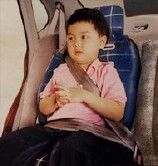
WEDNESDAY, Nov. 21 (HealthDay News) — Spending just 10 minutes in the backseat of a car with a smoker in the front increases a child’s daily exposure to harmful air pollutants by up to 30 percent, a new study finds.
And cracking a car window doesn’t help.
U.S. researchers took 22 air-quality measurements inside a nonmoving vehicle after three cigarettes had been smoked within one hour. The measurements were taken in the backseat of the vehicle at the breathing height of a child, first with the front windows fully open and again with the front windows open about four inches.
The researchers also measured air pollutant levels outside the car. The types of pollutants measured inside and outside the car were those normally emitted by both cigarettes and cars, including particulate matter, polycyclic aromatic hydrocarbons (PAH), carbon monoxide and nicotine.
Exposure to PAH, in particular, has been linked to immune system problems, wheezing, IQ changes and allergy development, the researchers noted.
The tests showed that pollutant levels inside the car at both window settings were three times higher than those measured outside the car, according to the study published online Nov. 21 in the journal Tobacco Control.
The pollutant levels inside the car exceeded those found in restaurants, bars and casinos, according to a journal news release.
“Children are more vulnerable than adults, and their exposures to tobacco smoke in a vehicle are completely controlled by the adults with whom they share the vehicle,” wrote Dr. Amanda Northcross, of the University of California at Berkeley, and colleagues.
“Although regulations have been enacted to protect nonsmokers, including children, in many public venues, secondhand smoke exposures to children in vehicles are permitted in 44 of 50 U.S. states, and in most countries worldwide,” the researchers noted.
The findings support moves to prevent children from being exposed to secondhand smoke in cars, the researchers concluded.
More information
The American Academy of Otolaryngology — Head and Neck Surgery has more about secondhand smoke and children.

